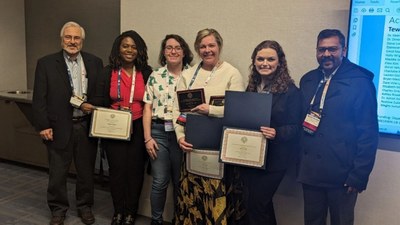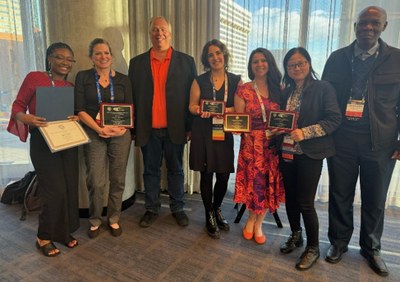2024 SOT Awards and Announcements
Congratulations to CIEHS members who served as chairs, won awards, and presented at the Society of Toxicology (SOT) annual meeting that occurred March 10-14 (Members names in bold).


John Wise, Sr., was featured as a Thought Leader in Toxicology during the Society of Toxicology (SOT) Annual Meeting with a short film showcasing The Wise Labs innovative One Environmental Health approach. Watch video below.
Awards
Women in Toxicology Postdoctoral Achievement Award
Winner: Alexandra Nail, PhD
Mentor: J. Christopher States, Ph.D.
Metals Specialty Section Postdoctoral Award
1st Place: Alexandra Nail, PhD
Mentor: J. Christopher States, Ph.D.
Dermal Toxicology Stratacore Postdoctoral Award
1st Place: Alexandra Nail, PhD
Mentor: J. Christopher States, Ph.D.
Toxicologists of African Origin Student Travel Award
Winner: Alyah Bailey
Mentor: J. Christopher States, Ph.D.
Dermal Toxicology Edgewell Personal Care Student Award
Winner: Rachel Goff
Mentor: J. Christopher States, Ph.D. and Mayukh Banerjee, Ph.D.
CSS Dharm V. Singh Carcinogenesis Graduate Student Endowment Award
3rd place: Aggie Williams
Mentor: John Wise, Sr., Ph.D.
Environmental Carcinogenesis Merit Award for Graduate Students
Winner: Idoia Meaza
Mentor: John Wise, Sr., Ph.D.
Environmental Carcinogenesis Merit Award for Postdoctoral Researchers
Winner: Haiyan Lu
Mentor: John Wise, Sr., Ph.D.
Carcinogenesis Specialty Section Young Investigator Award
Winner: Jamie Young Wise. Ph.D.
James A. Swenberg Carcinogenesis Merit Award for Junior Faculty Members
Winner: Sandra S. Wise, Ph.D.
Mechanisms Specialty Sections Sheldon D. Murphy Student and Postdoctoral Endowment Award
Winner: Idoia Meaza
Mentor: John Wise, Sr., Ph.D.
American Association of Chinese in Toxicology. Innostar Best Abstract Award
3rd place: Haiyan Lu
Mentor: John Wise, Sr., Ph.D.
Gabriel L. Plaa Educational Award
3rd place: Frederick Adams Ekuban
Mentor: Matthew Cave, MD, Ph.D.
Served as Chair or Co-Chair
Chair: Mayukh Banerjee, Ph.D., Metals I Poster Session
Chair: Daniel Conklin, Ph.D., Air Pollution: Particulate Matter Poster Session
Chair: Walter Watson, Ph.D., Liver: In Vitro Poster Session
Chair: Jamie Young Wise, Ph.D., The “Cocktail Effect”: Studying the Greatest Uncontrolled Experiment Ever Launched! Mixtures Specialty Section, Symposium
Chair: Sanjay Srivastava, Ph.D., Advancements in Cardiotoxicity Assessment, Platform Session
Co-Chair: John Wise, Jr., Advances in Metal Toxicology: From Aging and Disease Causation to Detection and Regulatory Measures, Metals Specialty Section
Session Presentations
John Wise, Jr., Intersection of Toxicology and Aging: Current Understanding of Metal Exposure and Aging.
Continuing Education Course
Timothy O’Toole, Ph.D., Microplastics consumption promotes CVD risk and atherosclerosis.
Micro- and Nanoplastics Platform Session
Idoia Meaza Isusi, Mentor: John Wise, Sr., Ph.D. Particulate Hexavalent Chromium Targets the Expression of Genes Involved in Lung Cancer and DNA Repair Pathways in Human Lung Cells.
Mechanisms of Carcinogenicity Platform Session
Poster Presentations
The protective role of rhFGF1ΔHBS against DOX-induced cardiotoxicity in young mice. A. Abdelbaset-Ismail, X. Hui, C. Gu, J. Xu, Z. Deng, W. Tse, A. Raj, L. Cai, and Y. Tan.
Chronic Cadmium Exposure Suppresses the DNA Damage Response. A. N. Bailey, A. N. Nail, and J. States.
Arsenic-Induces Transcriptome-Wide Differential Alternative Splicing by Suppressing Splice Function of Zinc Finger Containing Apical Splice Regulators ZRANB2 and SRSF7. M. Banerjee, J. Y. Hwang, A. N. Nail, J. W. Park, M. L. Smith, and J. States.
Identifying the sex-specific effects of dioxin-like compounds on hepatic receptor activation. O. Bolatimi, Y. Hua, J. Luo, J. E. Hardesty, and B. Wahlang.
Polychlorinated Biphenyl 126 Promotes Alcohol-associated Liver Disease Pathology at the Transcriptome and Phosphoproteome Levels. P. Brizendine, T. Gripshover, B. Wahlang, J. Luo, M. Smith, J. Chariker, E. Rouchka, L. Cai, and M. Cave.
Low Concentrations of Hexavalent Chromium in Drinking Water Induce Alzheimer’s Disease Neuropathology: Using a Toxic Aging Coin Approach to Assess Hexavalent Chromium Neurotoxicity. W. Buchanan, S. Vielee, S. Roof, H. Lu, J. Wise, I. Meaza, A. Williams, C. Kouokam, S. Wise, L. Guo, J. Cai, J. Wise, Sr., L. Cai, and J. Wise, Jr.
Identification of the environmental pollutants and metabolic pathways associated with metabolic dysfunction associated steatotic liver disease. M. C. Cave, N. Samala, M. R. Smith, J. Luo, C. Pinkston, S. N. Rai, Y. Go, N. Chalasani, and D. P. Jones.
Global Profiling of Urinary Mercapturates and Glucuronides in Nonsmokers and Smokers. J. Y. Chen, S. R. Sutaria, C. G. Sears, M. Kulkarni, Z. Xie, H. Gao, R. J. Keith, P. Lorkiewicz, A. Bhatnagar, and S. Srivastava.
Reduction in the Activity of the Putative Enhancers of TFAP2A Contributes to the Repression of TFAP2A and Induces Apoptosis in Human Neural Crest Cells Exposed to Ethanol. F. Yuan, M. Bai, X. Wang, J. Liu, and S. Chen.
Contributions of TRPA1 and Hypertension in the Cardiovascular Effects of Short-term Exposure to Particulate Air Pollution in Mice. L. Jin, G. Bonvillain, S. Barnett, A. Miller, G. Shirk, A. Gumpert, and D. J. Conklin.
Impact of Hexavalent Chromium and High Fat Diet on Liver Disease. M. Delnicki, L. Guo, I. Meaza, A. Williams, R. M. Speer, J. Kouokam, S. S. Wise, J. P. Wise, Sr., J. P. Wise, Jr., S. T. Vielee, O. E. Bolatimi, M. C. Cave, and J. Y. Wise.
Obesogenic polystyrene microplastic exposures disrupt the gut-liver-adipose axis and are ameliorated by the dietary anthrocyanin, delphinidin. A. Ekuban, J. Zhao, N. Adiele, D. J. Conklin, M. C. Cave, and T. E. O'Toole.
Perfluorooctane Sulfonate (PFOS) and Ethanol Interactions Modify ADME and Toxicity in a Mouse Model of Alcohol-Associated Liver Disease. F. A. Ekuban, P. Brizendine, T. C. Gripshover, B. Wahlang, J. Abramson, K. Z. Head, K. Biswas, D. Bello, J. J. Schlezinger, and M. C. Cave.
Arsenic Induced Suppression of Autophagic Protein Degradation is Zinc Dependent. R. Goff, J. States, and M. Banerjee.
Community-Engaged Research Focused on PFAS in Western Kentucky. G. Griffin, A. Hoffert, A. Berger, T. Berger, A. Carrier, A. Decker, S. Blosser, A. Specht, S. Jump, C. Aiton, L. Huntington-Moskos, and J. Young Wise.
Endogenous FGF16 deficiency aggravates diabetic cardiomyopathy. C. Gu, Q. Lin, X. Hui, A. Abdelbaset-Ismail, J. Xu, Z. Deng, L. Cai, and Y. Tan.
Effect of human N-acetyltransferase 2 (NAT2) allelic variants on DNA damage and oxidative stress induced by nitro-PAHs in Chinese hamster ovary cells. M. R. Habil, and D. W. Hein.
Effect of Thermal Stress on Gene Transcription and Endothelial Cell Functions. H. Husain, N. Wickramasinghe, I. D. Sithu, I. Zelko, and S. Srivastava.
Effects of inhaled benzene on pulmonary function in diabetic mice. A. Hussain, S. McFall, S. Srivastava, and I. N. Zelko.
Particulate Hexavalent Chromium Exposure Induces DNA Damage and Disturbs Homologous Recombination Repair in Lung Tissue. H. Lu, S. S. Wise, G. Hoyle, J. H.
Toyoda, R. M. Speer, T. J. Croom-Perez, I. Meaza, A. Williams, J. P. Wise, Jr., J. Kouokam, J. Young Wise, C. Zhu, K. Kondo, and J. P. Wise, Sr.
Exposure to a persistent organic pollutant mixture resulted in sex-specific steatotic liver disease in a diet-induced obesity mouse model. B. Luulay, Y. Hua, O. Bolatimi, J. Luo, T. C. Gripshover, W. H. Watson, and B. Wahlang.
Heat Shock Proteins: Quenching the ‘Fire’ of Benzene-Induced Endothelial Activation? S. A. McFall, N. S. Wickramasinghe, B. S. Taylor, M. V. Malovichko, D. J. Conklin, I. Zelko, T. Malik, C. Ng, and S. Srivastava.
Particulate Hexavalent Chromium Targets the Expression of Genes Involved in Lung Cancer and DNA Repair Pathways in Human Lung Cells. I. Meaza Isusi, R. M. Speer, C. J. Kouokam, and J. P. Wise Sr.
Chronic Cadmium Exposure Disrupts Metal Homeostasis and DNA Double-Strand Break Signaling. A. N. Nail, A. N. Bailey, L. Cai, and J. States.
Microplastics consumption promotes CVD risk and atherosclerosis. J. Zhao, N. Adiele, A. Ekuban, D. Gomes, D. J. Conklin, M. Cave, and T. O'Toole.
Disposable E-Cigarettes Evoke Arrhythmias Dependent on Flavors. R. Paily, A. Ramalingam, A. Bhatnagar, M. Nystoriak, and A. P. Carll.
Benzene Disrupts Cardiac Electrophysiology While Altering Cardiac Ion Channel Gene Expression in Mice with Pressure Overload-Induced Left Ventricular Hypertrophy. S. Raph, I. Zelko, S. Srivastava, and A. P. Carll.
Overexpression of Pulmonary Extracellular Superoxide Dismutase Does not Prevent E-Cigarette-Induced Autonomic Imbalance and Arrhythmias. B. R. Reynolds, S. Raph, R. Roberts, A. Ramalingam, S. P. Jones, and A. P. Carll.
A Novel Arsenic Methyltransferase Splice Variant is Expressed in Human Keratinocytes. C. H. Reynolds, A. N. Nail, M. Styblo, P. Cable, and J. States.
Associations of Urinary Glucuronic and Mercapturic Acids with Inflammatory Parameters. S. R. Sutaria, J. Y. Chen, C. G. Sears, M. Kulkarni, Z. Xie, H. Gao, R. J. Keith, P. Lorkiewicz, A. Bhatnagar, and S. Srivastava.
Inhaled Benzene Exposure and Vascular Inflammation. B. Taylor, I. Zelko, M. Malovichko, S. McFall, D. Conklin, and S. Srivastava.
Hexavalent Chromium Induces Behavioral Neurotoxicity in a Guinea Pig Model: A New Model for Cr(VI) Neurotoxicity. S. T. Vielee, I. I. Meaza, L. Buchanan, S. Roof, H. Lu, L. Guo, S. S. Wise, J. Easley, J. C. Kouokam, J. Young Wise, A. R. Williams, J. P. Wise, Sr., J. Cai, and J. P. Wise, Jr.
Activation of Triglyceride Synthesis by EtOH is Dependent on α4 Nicotinic Acetylcholine Receptor (α4 nAChR). W. H. Watson, B. Horsman, J. D. Ritzenthaler, and J. D. Roman.
Inhibition of RAD51D of the BCDX2 Complex Is a Key Driver of Hexavalent Chromium Induced Suppression of RAD51. A. R. Williams, I. Meaza, H. Lu, J. H. Toyod2, C. J. Browning, S. S. Wise, C. J. Kouokam, and J. P. Wise, Sr.
Telomerase-mediated Lifespan Extension in Whale Cells Provides a New Model for Chemical Carcinogenesis. S. S. Wise, J. Wise, J. Easley, I. Meaza, H. Lu, and J. P. Wise.
Honey as an Environmental Indicator of Metal Pollution in the United States. J. P. Wise, Jr, R. M. Speer, J. T. Wise, and A. J. Specht.
